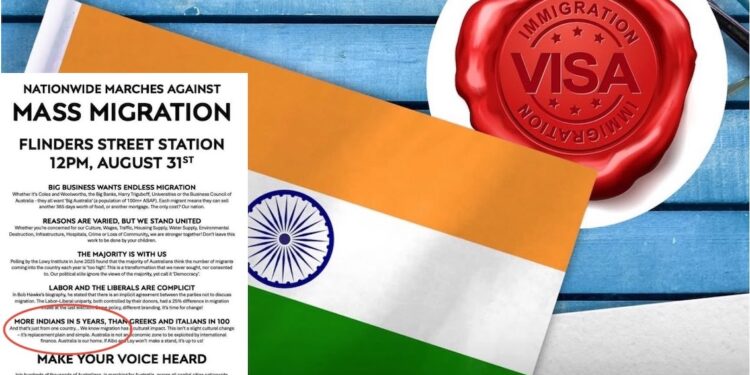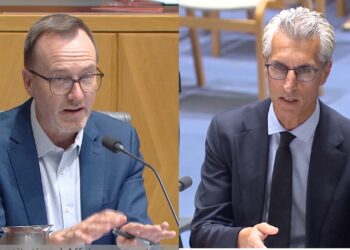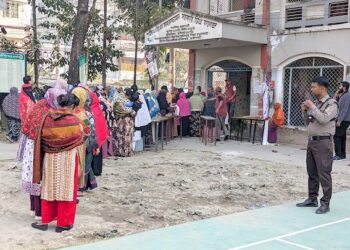Australia’s Race Discrimination Commissioner Giri Sivaraman has condemned the circulation of anti-Indian flyers and called for urgent government action to address structural racism, warning that multicultural communities across the nation feel increasingly unsafe.
Speaking on NRI Affairs’ Feature Editor Nandini Sen Mehra’s program ‘Pause with Nandini’, Commissioner Sivaraman described the flyers—which claim there have been “more Indians in five years than Greeks and Italians in 100″—as “terrible” and “unacceptable.”
“I’m from the Indian community, I was born in Chennai, I think that I understand if the community feels unsafe and really disturbed and upset about it, and they have every right to,” Sivaraman said. “I don’t know if that statistic has any truth to it either.”
The commissioner highlighted a troubling pattern in Australian society, noting that racism has historically targeted successive waves of migrants. “There was racism towards Italians and Greeks when they migrated here, then there was racism towards the Vietnamese, there’s been racism now towards Indians as evidenced in that poster,” he said.
“This just confirms we have a fundamental problem. Every time someone comes, there’s this spiral of racism, so that means that our structures are racist.”
Communities feeling targeted
Sivaraman revealed he has been contacted by community members, leaders, and peak organisations who report feeling unsafe amid rising anti-migrant sentiment. He warned against the dangerous tendency to blame migrants for complex societal problems such as housing shortages.
“Migration may have some sort of impact on it, but there are a lot of other factors that clearly have an impact, for example our tax system, and the way in which our banks act in lockstep and have massive profits,” he said.
“The problem is that when migrants get blamed, often the only signal as to whether someone’s a migrant is the colour of their skin or the way they talk or their name.”
The commissioner also addressed recent physical attacks on people of colour, including two women attacked on a train in Sydney. He stressed that staying home was not the solution, saying: “We should all be entitled to be safe in public and to be able to go about our daily business without feeling vulnerable or targeted.”
Framework stalled for nine months
A key concern raised during the interview was the government’s lack of response to the National Anti-Racism Framework, which was tabled nine months ago.
“To date they haven’t responded. There’s been no commitment to, there’s no endorsement of it, nor has there been any commitment to funding the recommendations in it,” Sivaraman said.
He criticised the ad hoc approach to addressing racism, noting that some levels of government refuse to use the word “racism” and instead rely on euphemisms like “social cohesion.”
“We won’t get along by pretending racism doesn’t exist. We actually have to confront it first,” he said.
“There are some levels of government that don’t even want to use the word racism, or use euphemisms like social cohesion……. If it means we should all get along, I absolutely agree we should all get along, but we won’t get along by pretending racism doesn’t exist. We actually have to confront it first.”
The framework’s first recommendation calls for a National Anti-Racism Taskforce that would include senior department secretaries, the commission, and community leaders to coordinate responses and prevent communities from being “pitted against each other” in competition for resources.
Structural reform needed
Sivaraman emphasised that Australia’s racist structures were “built during colonial times and baked in during the white Australia policies” and need comprehensive reform to reflect the country’s diverse population and acknowledge First Peoples.
He outlined a multi-pronged approach needed to address racism effectively, including better racial literacy and cultural safety within police forces, improved complaints mechanisms, and proper data collection to document racist incidents.
“Most people don’t report racism or racist violence because they don’t expect anything to happen if they do,” he said. “What that indicates to me is our structures are broken. They need fixing across all areas of our lives.”
The commissioner warned that without structural change, the cycle of targeting different migrant communities would continue, with “broken structures” giving licence to interpersonal racism.
Queensland Senator Paul Scarr has also spoken out against the anti-Indian pamphlets, describing them as “outrageous and despicable” and emphasising that Indians are valuable community members.
The interview highlighted growing concerns about community safety and the urgent need for coordinated government action to address both immediate threats and long-term structural issues driving racism in Australia.
Responding to racism
If you witness or experience racism, you may want to report it, seek support, or support those who have been negatively impacted. There are multiple services and reporting mechanisms available to help.
Emergency situations: If you think you or somebody else may be threatened or in danger, call the police on 000. You can also report behaviour that you think might be a criminal offence after an incident by phoning the police on 131 444.
Support services: If you need emotional support after experiencing racism, services include Lifeline (13 11 14), Beyond Blue (1300 22 4636), and specialised multicultural mental health services. For Aboriginal and Torres Strait Islander people, support is available through 13 YARN (13 92 76) and other culturally appropriate services.
Reporting racism: You can lodge complaints about racial discrimination with the Australian Human Rights Commission at no cost by calling 1300 656 419 or emailing complaintsinfo@humanrights.gov.au. Online racism can be reported to the Office of the eSafety Commissioner, while state and territory anti-discrimination commissions also handle complaints.
Community registers: Several community-led reporting mechanisms exist, including the First Nations Racism Register, the Islamophobia Register, and registers for anti-Palestinian and antisemitic incidents, which help document racism patterns and drive systemic change.
If you need an interpreter, call the Translating and Interpreting Service (TIS National) on 131 450 to access any of these services.











